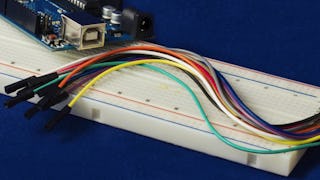This course features Coursera Coach!
A smarter way to learn with interactive, real-time conversations that help you test your knowledge, challenge assumptions, and deepen your understanding as you progress through the course. Mastering Hardware Protocols with ESP32 and Arduino is designed to equip learners with essential skills for understanding and implementing various communication protocols like UART, I2C, SPI, OneWire, and non-standard protocols such as DHT11 and DHT22. The course begins with an introduction to the fundamentals, helping learners grasp the importance of hands-on practice alongside theoretical concepts, ensuring they build practical skills from the outset. Through engaging video lessons, students will dive into topics such as setting up the VSC PlatformIO program in Arduino IDE, differentiating wireless protocols, and using tools like PulseView for signal analysis. The course offers a step-by-step exploration of each protocol, from theory to real-world application, with a focus on using logic analyzers and various Arduino devices. By the end of the course, learners will have a comprehensive understanding of serial communication, sensor interfacing, and how to analyze and optimize signals. Whether working with basic hardware like the DS18B20 temperature sensor or advanced setups involving the ESP32, this course ensures that you not only understand the protocols but also how to implement them efficiently for different projects. This course is ideal for electronics enthusiasts, makers, and developers who wish to advance their knowledge of hardware communication protocols and work with embedded systems. It is suitable for individuals with a basic understanding of electronics and programming, though a prior background in Arduino or microcontrollers is recommended.

















